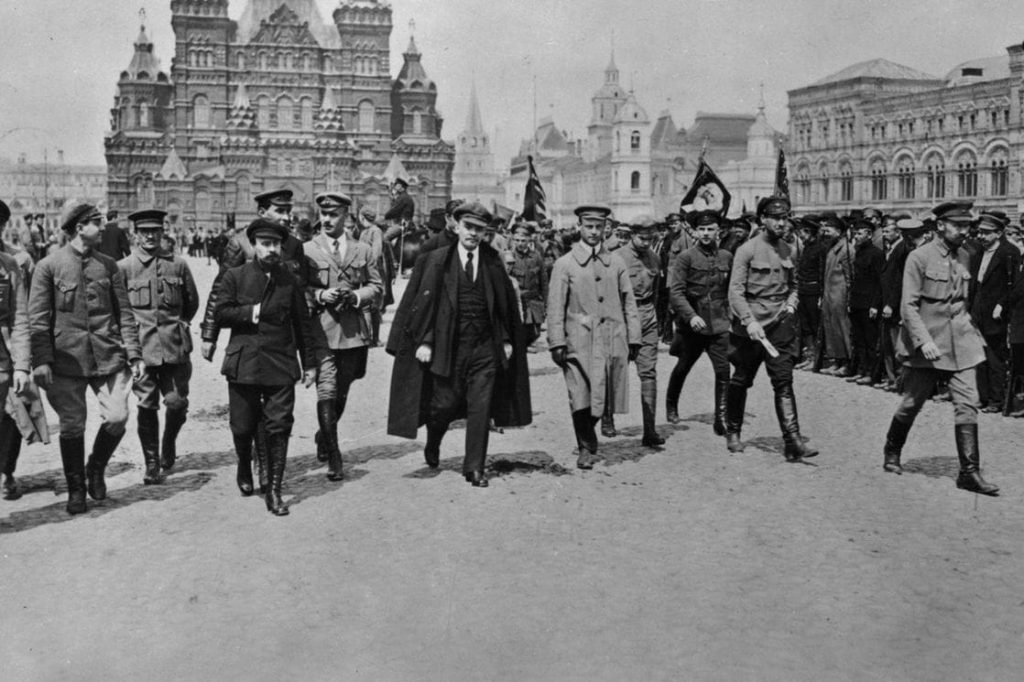
Vukašin Marković was born in the village of Piperi, Montenegro in 1874 to a poor farmer family. As a child he was very bright and a gifted learner so his parents decided to support his further schooling despite the harsh conditions they lived in. He attended elementary school in his birth village and the city of Podgorica, later continuing his education in Jagodina, Serbia. After graduating from school he went to Novocherkassk, Russian Empire, in order to enrol in the Donsk Seminary.
In 1903, he participated in the 2nd Congress of the Russian Social Democratic Party in London where he stood with Lenin, forming a personal friendship with him. Marković went on to become a member of the Bolsheviks during the Russian revolution of 1905.
Carrying on his studies, he left for Kharkov, where he enrolled in veterinary and medicine schools and achieved a doctorate degree in 1912.
He later married Jeanne Labourbe, a French revolutionary whom participated in the October revolution and co-founded the French Communist Group in Moscow. Labourbe was subsequently killed in 1919 in Odessa by the White guard.
During the Balkan wars and WWI, Marković resided in Serbia and Montenegro, where he, as a part of the Russian Red Cross, helped heal the wounded. After the Serbian army fell back to Greece, he returned to Russia, where he worked as a military doctor.

Marković played a leading role in the October Revolution, 1917, especially during the battle for the Kremlin. Afterwards Lenin sent him to the Southern Front, where he reached the rank of Division Commissar. Because of his conflicts with Trostky, Lenin eventually transferred him to Moscow. During this time, he helped the Blosheviks in battles of Sparrow Hills and Sretensky Boulevard.
Remarking on the October Revolution, he said that it was a “comfortable and happy period such as it is a comfortable and happy time for a fish that swims in the tempest.”
He was one of the leaders of the Yugoslav communists in the Soviet Union with the task of spreading communist idea in the Balkans. After the Commintern was founded, he was chief officer of the Balkan section within it.
Following the formation of the Kingdom of Serbs, Croats, and Slovenes (SHS), the first constitutional parliamentary elections were held in 1920. The Communists achieved a great result and even majority in some larger and significant cities. Due to their successes, the monarchist regime of the Karadjordjevic dynasty issued a ban on communism and the movement, forcing the Communist opposition to operate underground.
Marković came to the SHS in 1921 with the intention of strengthening and helping the party structure in Montenegro and potentially starting a revolution. He spent the next four years in Montenegro, facing persecution and arrests by the regime. Montenegro was in a great state of turmoil between the independents, who wanted a sovereign Montenegro and the return of the Petrovic dynasty, and unionists who wanted to annex the nation to the Kingdom of Serbia, under the Karadjordjevic dynasty.
Marković’s plan was to establish the Socialist Republic of Montenegro. To achieve this, he joined with guerilla groups fighting for independence. After years of fighting, the regime promised him that he will be pardoned if he ended the conflict. Although Marković agreed, they did not fulfill the promise and arrested him. However, he managed to escape from the prison in Cetinje in 1925, returning to the Soviet Union via Austria.
After his recovery, Marković was sent by the Commintern to China in order to assist with their own uprising. By this period he had amassed an enormous amount of respect by Communist leaders around the world, who trusted him with a tasks of such magnitude.
During the Stalin era, Marković was an outspoken critic of the purges. Arguing with Soviet leadership, he also frequently sent Stalin letters of protest. Marković was constantly followed by the NKVD, and then arrested in 1937, where he was sent to a sanitorium somewhere in the Ural Mountains. Officially, his fate is not known to this day, nor where he was buried, but many theories and stories exist.
Vukašin Marković is a remarkable figure, a first-class revolutionary, and a Communist. He is a man who sacrificed his whole life for the expansion of the global Communist movement and revolution. He played an integral part in the history of communism, globally.
Alek Barovic, is a masters student based in Dublin



